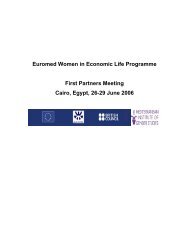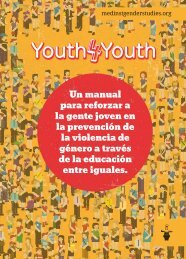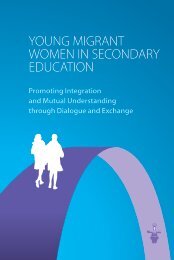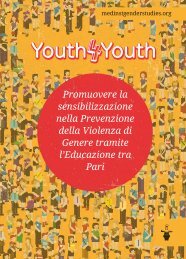react to domestic violence
react to domestic violence
react to domestic violence
Create successful ePaper yourself
Turn your PDF publications into a flip-book with our unique Google optimized e-Paper software.
Building a Support System for Victims of Domestic Violence<br />
The Social Welfare Services (SWS) are responsible for granting public assistance <strong>to</strong> victims under the Public<br />
Assistance Law. Under the Public Assistance and Services Laws 1991-2003, a person legally residing in Cyprus<br />
whose resources are not sufficient <strong>to</strong> meet his/her basic and special needs, may be entitled <strong>to</strong> financial assistance<br />
and/or social services. In 2006, the Law on Public Assistance was amended <strong>to</strong> financially reinforce public<br />
assistance recipients and encourage their integration in the labour market. Victims of <strong>violence</strong> can and do benefit<br />
from the public assistance scheme but most do so as ‘single parents’ given they meet income and other<br />
criteria. Single parents are also entitled <strong>to</strong> additional benefits within this framework. For example, for singleparent<br />
families 50% of the net income from employment is not taken in<strong>to</strong> account when determining the right<br />
<strong>to</strong> and the amount of public assistance. Child benefit is also not taken in<strong>to</strong> account. Single parents are also<br />
eligible for an additional monthly allowance, including additional amounts for each dependent child.<br />
However, according <strong>to</strong> the participants <strong>to</strong> this study, there are often long delays in granting public assistance<br />
<strong>to</strong> victims, which puts them in an extremely vulnerable position as they are usually in need of immediate economic<br />
support. This particularly affects those women who are in the shelter run by the Association for the<br />
Prevention and Handling of Domestic Violence and whose futures are extremely uncertain. This may be exacerbated<br />
further in the case of migrant women whose residency status is uncertain and may not be eligible for<br />
any public support. According <strong>to</strong> the Association for the Prevention and Handling of Family Violence, even<br />
when women leave the shelter and manage <strong>to</strong> find new accommodation and employment, public assistance<br />
is often not enough <strong>to</strong> cover their basic needs and those of their children.<br />
The Cyprus National Strategy for Social Inclusion (2008-2010) describes a number of policy measures on social<br />
integration of vulnerable groups including vocational training, and measures <strong>to</strong> promote their integration in<br />
the labour market. However, women victims of <strong>violence</strong> are not recognized as a distinct vulnerable group<br />
within this framework. This is one of the most serious problems faced by the victims that need urgent economic<br />
support, childcare, access <strong>to</strong> the labour market, and/or vocational and other training.<br />
“We have a big gap in mechanisms that support women victims of <strong>domestic</strong> <strong>violence</strong> especially after<br />
they leave the shelter, in terms of public assistance, housing and also programmes for re-integration.”<br />
National Machinery for Women’s Rights<br />
When designing integration/social inclusion programmes, it is essential that these address those fac<strong>to</strong>rs that<br />
contribute <strong>to</strong> the marginalization of women in all areas and render them socially vulnerable. Although economic<br />
assistance is important, it must be emphasised that this cannot be considered a cure-all in addressing<br />
the needs of victims of <strong>violence</strong>. Such programmes must include measures for adequate housing, employment,<br />
vocational training, and childcare services, and be linked <strong>to</strong> the gender equality and women’s rights<br />
framework. So although social benefits are vital for the immediate support of victims of <strong>violence</strong>, these must<br />
be accompanied by active inclusion policies that take in<strong>to</strong> account the specific needs of women from a gender<br />
perspective.<br />
4.5 Perpetra<strong>to</strong>r Programmes<br />
The Association for the Prevention and Handling of Domestic Violence in the Family runs two related intervention<br />
programmes called “Compassion” which are designed for perpetra<strong>to</strong>rs of <strong>domestic</strong> <strong>violence</strong> on the<br />
one hand, and victims of <strong>violence</strong> on the other. The first is directed <strong>to</strong>ward men with violent behaviour and is<br />
designed <strong>to</strong> help them take responsibility for their anger and behaviour, change their attitudes and perceptions<br />
<strong>to</strong>wards such <strong>violence</strong>, and thus prevent violent behaviour from reoccurring. The other is for women<br />
victims of <strong>violence</strong> aiming at empowering them through self-compassion techniques in order <strong>to</strong> find their<br />
inner strength and be able <strong>to</strong> take the best decisions for themselves, as well as for their relationships. Thus, the<br />
programme claims <strong>to</strong> have has both a preventative as well as a treatment element in that it aims <strong>to</strong> prevent<br />
21







